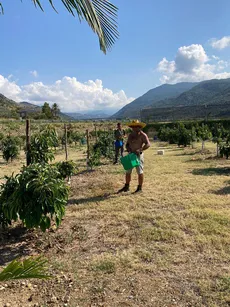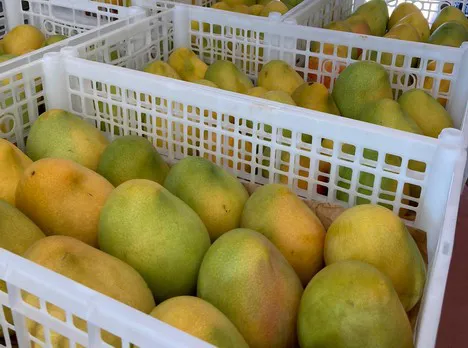 The harvesting of Sicilian mango at McGarlet's Italian supplier Be Fruit started around ten days ago and will continue until late October. The company started growing exotic fruit in 2012 and is expecting to harvest 30 tons (which will become 60 next year).
The harvesting of Sicilian mango at McGarlet's Italian supplier Be Fruit started around ten days ago and will continue until late October. The company started growing exotic fruit in 2012 and is expecting to harvest 30 tons (which will become 60 next year).
Over the past few years, tropical fruit has become increasingly popular in Italy as well, so crops have been expanding. Due to its climate and soil conditions, Sicily is proving particularly suitable to grow these plants.
Mango demand has doubled in less than 10 years (4,500 tons in 2007 vs. 9,000 tons in 2016), so crops went from covering just a few hectares to over 500 hectares [data collected and published by Corriere Economia].
The Italian challenge regarding tropical fruit
The agronomic techniques required to grow these fruits are very complex and require extensive studies and experience. What is more, customers still find it difficult to think that good tropical fruit may come from a country that is not a traditional producer.
Luca Garletti, Ceo at McGarlet, a company that has been dealing with distribution for over 90 years, believes "Italy has the possibility of supplying a new product while also intercepting niche consumers."
Businesses like BeFruit, a company located in Caronia (Messina), are conducting important agronomic studies while analyzing the soil and local climate conditions to improve crops and supplying the market with produce of the highest quality.

The importance of knowing varieties
One of the main objectives is to not only focus on Kensington Pride, the first type planted in Sicily, but to also introduce the Glenn variety, which works well with the Sicilian soil and climate and is rarely grown on a global level, as well as the Keitt and Kent varieties.
This way, the fruit could be available between August and November. The season would start with Glenn, which ripens in August, followed by Kensington Pride, Kent and Keitt.
The role of consumers
A recent Coldiretti survey reports that 61% of Italian consumers would rather purchase Italian exotic fruit. 71% would also be willing to pay more for it. This data is justified by its degree of freshness, organoleptic qualities and food safety.
Final consumers must be "educated" to be aware of the mango variety they are about to purchase. Also because each variety has a different texture, sugar level and flavor.
"Varieties will be the most important element in the future. The domestic and European markets have a strong need for tropical fruit. The Italian produce can compete with that from exporter countries, provided that more companies obtain the international GlobalGAP and Grasp certifications and that they pay more attention to packaging, grading and sorting."
Befruit recently obtained the two certifications mentioned: the former defines good agricultural practices for the development of agriculture, while the latter focuses on ethics.
McGarlet is increasingly convinced of its collaboration with BeFruit to supply its clients and final consumers with unique Italian produce.
For further information: McGarlet Srl
McGarlet Srl
Via Nicola Calipari, 12
24061 Albano S. Alessandro (BG)
Tel.: +39 035 4521314
Email: mcgarlet@mcgarlet.it
Website: www.mcgarlet.it
Antonio Rinaldi
Cell.: +39 344 1432205
